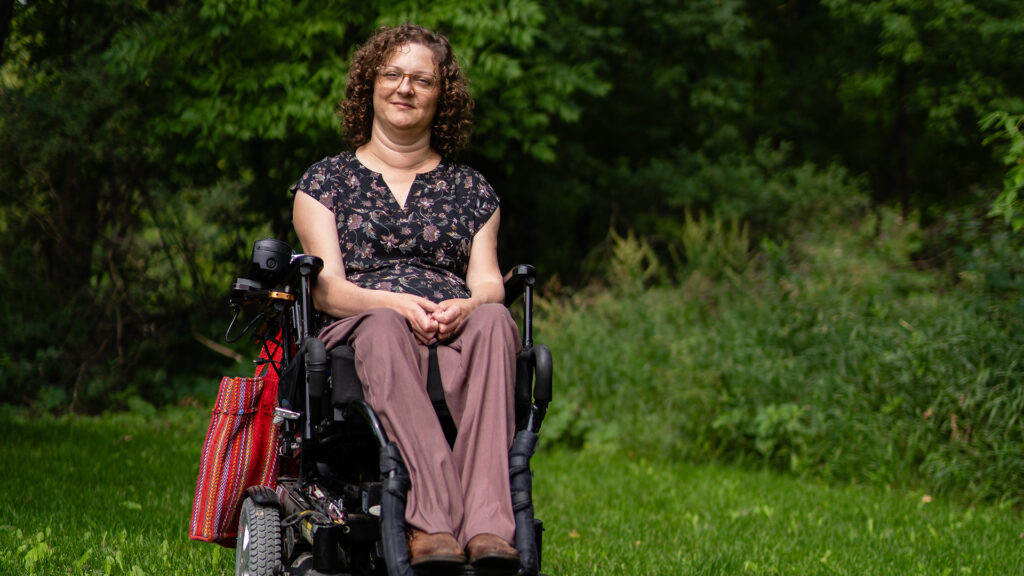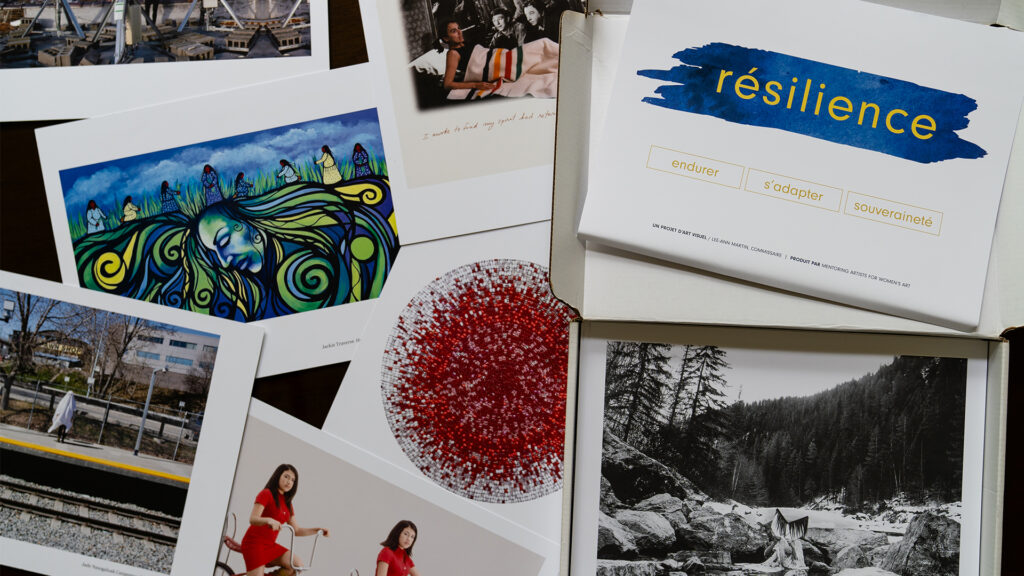A flock of 2D songbirds adorn the wall beside Yvette’s dining table, revealing their delicate beauty and her keen skill.
Ruby-throated hummingbirds and black-capped chickadees—her trademark illustrations—live within a gallery of white frames, while chirping songbirds flit and flutter in the garden on the other side of the window, feasting on birdseed.
That bridge between the human and animal worlds inspired Yvette to spread her wings as a visual artist decades ago.
“Art is just such a powerful way to communicate,” shared Yvette, whose award-winning artwork has been showcased in solo and group exhibitions across Manitoba and eastern Canada.
“I’m a Francophone Métis woman artist with a disability, so there are a lot of topics that I can explore in my work.”
Before it became her vocation, art was a fleeting interest Yvette inherited from her mother, who dabbled in drawing, crafting, and ceramics. Gradually, art grew from pastime to passion to profession—only a few years after the accident.
It happened the summer she was 15.

Up until that point, Yvette lived a “normal teenage life”—working as a cashier at a grocery store, making crafts, and spending time with friends.
But on a hot summer’s day, while hanging out at a friend’s backyard, Yvette dove head-first into the pool . . . and something went terribly wrong.
“I was doing the math and knew the way I was going to land was not going to work out well,” explained Yvette.
“Paralysis was instant.”
Yvette’s friends frantically called an ambulance. Terrified and unable to move, Yvette knew immediately she was “in for quite a challenge.”
"Paralysis was instant."
For the next five months, a rehabilitation unit at a Winnipeg hospital became Yvette’s home. While her friends were getting driver’s licenses, she was learning how to navigate life in a wheelchair.
Yet her steady spirit and resilience fuelled her during such a scary, uncertain time. That, and the comfort of community she found bunking with a handful of youth facing similar health challenges.
“It was like our little gang,” Yvette smiled. “We helped each other out and encouraged each other—and so right away, I knew I wasn’t alone. I had peers who were in the exact same situation as me.”
Another lifeline was the kindness and care she found in Spinal Cord Injury Manitoba, a donor-supported agency helping Manitobans living with spinal cord injury for over 75 years.
“They came to my hospital bedside almost right away,” shared Yvette. Gratefully, she built a relationship with the Spinal Cord Injury Manitoba counselor who worked directly from Yvette’s hospital ward.
“I’d have daily contact with that person—and then, I could feel safe and confident enough to confide in them.”
From teaching her how to drive a car to wrapping a compassionate community of peers around her, Spinal Cord Injury Manitoba helped guide Yvette in her new way of living.
“What I appreciate most about Spinal Cord Injury Manitoba is the fact that it’ll teach you things you won’t necessarily learn in rehab, things that are very practical that you use day-to-day,” shared Yvette.
“Every milestone I’d go through in my life, Spinal Cord Injury Manitoba was there in the background making me look good.

“Spinal Cord Injury Manitoba came to my hospital bedside almost right away.”
When Yvette returned home after rehab, she immediately prepared for her next challenge: finishing high school.
“I didn’t want to miss any school, because my goal was to graduate with the rest of my class,” explained Yvette, who had earned a couple of credits while in hospital.
“I just worked really hard when I got back to catch up.”
Not only did Yvette graduate on time with her friends, she joined them that fall at university. Spinal Cord Injury Manitoba helped her apply for funding for her Bachelor of Education and assisted her in securing a work placement in a grade two classroom.
With 40% of Manitobans living with a disability being unemployed, Yvette was grateful Spinal Cord Injury Manitoba was there to help her get started with her career. She described their support and encouragement as “very valuable—because otherwise, I wouldn’t have been able to go to university. I probably would’ve felt a little scared to take on that adventure by myself.”
“Now I work in a field where I’m able to meld education and art together ... I have Spinal Cord Injury Manitoba to thank for all of that.”
After five years of teaching, Yvette eagerly began pursuing another dream: becoming an artist.
Though her spinal cord injury impacts her upper bodily mobility, Yvette has some function in her arms, allowing her to use orthotics to draw, paint and create art digitally using a computer.
“We don’t always realize the power of art,” said Yvette, illuminating what a profound and poignant tool it can be for self-expression.
Once again, Spinal Cord Injury Manitoba cheered Yvette on in her studies and helped her find funding for a second degree in Fine Arts.

Today, Yvette is an art education specialist through her job at Mentoring Artists for Women’s Art (MAWA), a nonprofit fostering the artistic development of women and people who are non-binary, trans, and Two Spirit.
“Now I work in a field where I’m able to meld education and art together—and that, for me, is the perfect combination,” said Yvette. “And I have Spinal Cord Injury Manitoba to thank for all of that.”
Known for her surreal and poignant digital collages, Yvette’s stunning artwork has been featured in galleries throughout Manitoba, Québec, and Ontario. Yet the artistic achievements she feels most proud of are the many ways she’s given back to the community.
A teacher at heart, she’s especially proud of a MAWA project that landed in the hands of students in classrooms throughout Manitoba and across the country—an art education resource celebrating the brilliance of Indigenous women artists.
Working with fellow art educators and Elder Albert McLeod, Yvette helped produce Resilience—a boxed set of stunning contemporary Indigenous art cards with a corresponding bilingual teaching guide for kindergarten to grade 12 students.
“Art is such an accessible way to see someone else’s perspective,” she explained.
“[The Resilience Project] was really an act of reconciliation. It’s a tool kit for integrating Indigenous themes, knowledge, history, and contemporary realities into the classroom.”

“I’m a Francophone Métis woman artist with a disability, so there are a lot of topics that I can explore in my work.”
Tirelessly seeking ways to nurture her community, Yvette is also a volunteer peer mentor with Spinal Cord Injury Manitoba, offering the support and empathy that made such a difference to her.
“Spinal Cord Injury presented me with peers out in the community who had been injured for longer periods of time and who could give me advice or share success stories or difficulties or how they overcame challenges,” said Yvette.
“Just meeting those people and visiting their homes and families made me feel like anything that I wanted to do was possible. If someone else could do it, it was doable for me, too.”
Laurence Haien, Senior Rehabilitation Counsellor at Spinal Cord Injury Manitoba, is proud to witness the phenomenal care Yvette extends to people with new injuries.
“It takes an exceptional person to allow themselves to be vulnerable while providing emotional support and hard-won wisdom to lessen the fears and anxieties of those she serves,” said Laurence.
“Yvette probably does not realize the good that she has done for many Spinal Cord Injury Manitoba members over the years and the ways she has profoundly changed their lives.”

Over 30 years after her accident, Yvette’s advice for someone living with a spinal cord injury or other challenges is to keep pushing forward—all while giving yourself a healthy dose of grace.
“Be kind to yourself and have expectations for your life and your future, but accept there’s more than one way to do something, more than one path. You’ll find new ways to do what you love and maybe even discover new things you love.”
With a clever smile, she added, “Keep those doors open and don’t be afraid to ROLL into them.”





